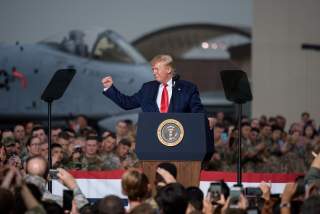Trump Should Reassess America’s Commitment to South Korea
An American presence in Japan is not dependent on stationing troops in Korea, though Tokyo also could do far more militarily, almost certainly enough to deter threats from China.
Thus, he warned, America’s deployments entangle Washington in potential conflicts that could go nuclear yet the countries being defended won’t contribute enough to deter the conflicts. Indeed, he worried that the lack of sufficient conventional defense makes nuclear conflict more likely. At the same time, the DPRK’s pursuit of a real deterrent—ICBMs capable of carrying nuclear warheads and targeting the U.S.—makes America’s security guarantee far more expensive.
Not just expensive. Catastrophically, even existentially expensive. If the North acquires the ability to destroy American cities, even what started as a conventional war on the Korean peninsula likely would end with nuclear threats if not strikes. If the U.S. and ROK again were poised to overrun the DPRK, the latter would have to employ, or threaten to employ, nukes if the U.S. did not withdraw. America’s alliance with the ROK does not warrant taking such a risk.
Unfortunately, there is no way to eliminate the North’s nuclear arsenal short of war, which also would be too high a price to pay. Sanctions are a useful tool to pressure the North but alone are insufficient to force denuclearization. Diplomacy might mitigate North Korean behavior but is unlikely to cause Pyongyang to abandon weapons which took so much effort to create.
Kim certainly won’t do so without serious compensation. So far the president has offered nothing immediate (sanctions relief) or real (more than promised friendship) in exchange for the only deterrent that works against the globe’s superpower. After all, noted Robert Kelly of Pusan National University: “the history of U.S. behavior toward rogue states akin to North Korea, particularly toward Libya and Iran suggests that Washington will not keep its promises.” Kim would be a fool to give away his nukes for nothing tangible, and he is not a fool.
The most serious argument against a unilateral departure is that it might be useful in negotiating with the North. Argued Chun: “The withdrawal of U.S. troops is the most important card to play in getting North Korea to denuclearize. What I am most concerned about is that [Trump] will waste the card without using it. If he decides to withdraw troops out of exasperation without thinking of how to link to denuclearization negotiations, this becomes a dead card.”
So long as productive negotiations are underway, withdrawal could be delayed and offered as an inducement for disarmament. However, the unlikely prospect of full denuclearization should not be allowed to prevent a conventional withdrawal that is long overdue. A pull-out should be phased in any case and could begin with the prospect of full withdrawal presented as an inducement.
Some analysts view the North as bad and therefore a nuclear North as worse nevertheless prefer to face the latter than trade away America’s military presence in the South. Argued Kelly, buying off the North or adapting to a nuclear North would be bad, but trading away “tangible U.S. regional strategic assets” would be even worse. The latter would be “tantamount to a partial abandonment of South Korea and, perhaps, Japan.”
However, dropping a commitment that has lost its relevance—the peninsula lacks the security salience of the Cold War and the South is well able to defend itself—is not abandonment. An American presence in Japan is not dependent on stationing troops in Korea, though Tokyo also could do far more militarily, almost certainly enough to deter threats from China.
Moreover, even if “abandonment” is undesirable, it must be judged compared to what? Is it better to maintain a commitment that could result in the destruction of multiple American cities? The U.S. presence is supposed to be a means to defend America, not an end in itself. Washington should end any alliance or deployment that endangers this nation.
Doug Bandow is a Senior Fellow at the Cato Institute. He is a former Special Assistant to President Ronald Reagan, the author of Tripwire: Korea and U.S. Foreign Policy in a Changed World, and co-author of The Korean Conundrum: America’s Troubled Relations with North and South Korea.
Image: Reuters

